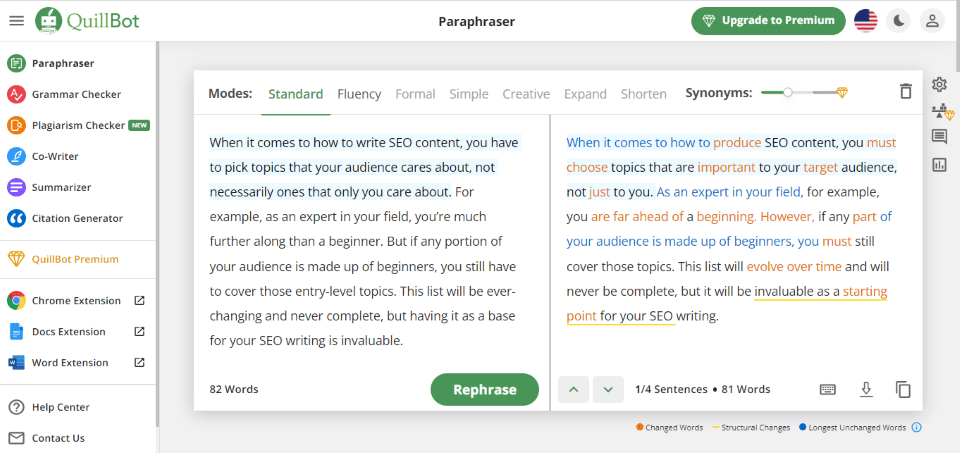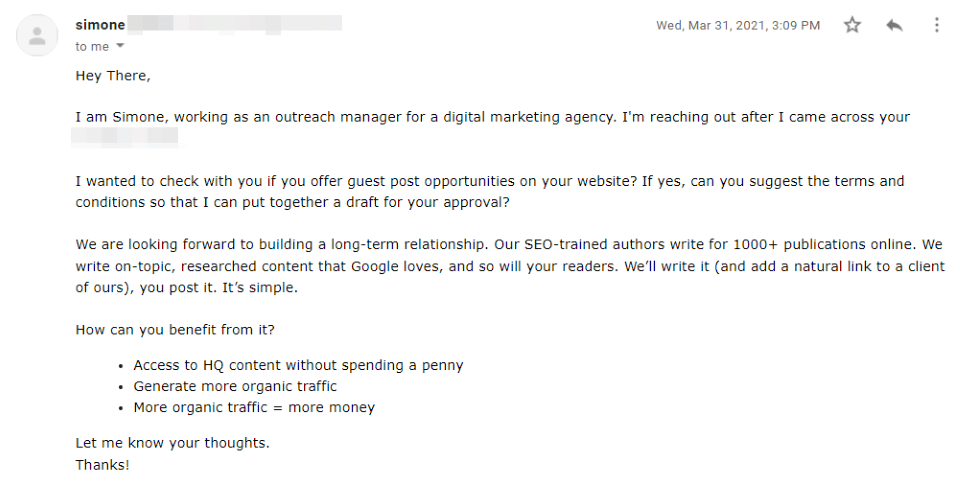It isn’t easy to write about topics that haven’t yet been covered. However, there’s a difference between using other articles as sources of inspiration and reproducing their content on your site. Article spinning can land you in hot water, so it’s important to know what it is and how to avoid it.
In this post, we’ll take a closer look at the practice of content spinning. We’ll discuss its effects on your site’s SEO and why it’s considered an unethical practice. Let’s get started!
What Is Article Spinning?
Article spinning, also known as content spinning, is similar to the practice most of our teachers warned us about in school: plagiarism. However, it might be easier to detect (and avoid).
In the digital world, articles spinning is when someone copies content from another source but swaps out certain words with synonyms to make it seem original. Let’s look at an example:
Original sentence: The child’s parents bought a new house.
Spinned sentence: The kid’s parents purchased a new home.
Of course, content spinning can be more elaborate than that. Typically, it involves large chunks of text, or even entire articles, copied from another source. However, the writer might change a few words and sentences to avoid getting penalized by Google for publishing duplicate content.
Unfortunately, the practice of article spinning is widespread in digital marketing. Some content creators use spinning to create a large number of posts in a short period and attempt to outrank their competitors in the SERPs.
How Is Content Spinning Different from Paraphrasing?
You might be wondering if article spinning is different from other rewriting techniques, such as paraphrasing. When you paraphrase, you usually communicate something in your own words — the meaning of the original content remains the same, but you change the structure, syntax, and often use simpler language to clarify the meaning. You can often paraphrase a long article into a single paragraph or two.
However, some writers might use an AI rewriter tool, such as QuillBot to attempt to paraphrase text:

In the screenshot above, we paraphrased a piece of text from one of our articles. As you can see, the tool produced a very similar result, using synonyms and occasionally modifying the structure of a sentence. This new text is more like content spinning than paraphrasing. Paraphrasing tends to summarize and consolidate ideas. This tool did not do that.
Many article spinners use these tools to quickly produce multiple rewrites of the same post. There’s not much difference between content spinning and paraphrasing in this scenario.
You might also have also realized that these AI-based tools will often produce grammatical errors and poorly structured sentences. In fact, it can be very easy to tell when AI has created an article.
In contrast, text that has been rewritten or paraphrased by a human might contain fewer errors. It would also read more naturally and possibly sound more authentic.
Is Article Spinning Bad for SEO?
In most cases, digital marketers use article spinning to build backlinks. For instance, let’s say you run a blog. You might often receive emails from SEO marketers offering to contribute an “original” article to your website. These posts will usually contain links to their clients’ sites:

Some brands pay marketers and SEO experts to help them get backlinks on other sites. They might request articles on specific topics, and the writer may use a paraphrasing tool or rewrite posts to deliver results as quickly as possible. Therefore, you can probably find that same article on many other sites, but with slightly different wording.
This SEO technique might benefit the brand, as you can earn backlinks from various websites. However, it can also harm your site. As we mentioned earlier, Google penalizes duplicate content. Therefore, article spinners try to fool the algorithms by using different words and slightly changing the content structure.
However, Google’s algorithms have become very good at identifying spammy content. The Panda and Penguin updates in 2011 and 2012 aimed to penalize users who engaged in black hat SEO techniques. These included link schemes and keyword stuffing.
Since then, the search engine has refined its algorithms to target article spinning, seeing it as plagiarism. Therefore, if you publish plagiarized content on your site, you risk getting a penalty.
Typically, a Google penalty results in a massive drop in search rankings. In the worst-case scenario, your content might even be removed entirely from search results. And not just the content from the spinner. All your content.
Additionally, Google favors high-quality and fresh content. Articles from AI spinners tend to be poorly written and can therefore hurt your rankings.
Is Content Spinning Ethical?
As we have explained, content spinning is a form of plagiarism. It involves copying content from other sources and presenting it as your own. When used in such a way, it is an unethical practice — in fact, you’re stealing copyrighted material.
Of course, you might write articles similar to those published by your competitors. You might even cover similar topics and ideas. However, if you’re not careful, you might be accused of copying their content. Some brands take plagiarism very seriously, and they might decide to take legal action against you. Thus, not only is article spinning unethical, but it can also be a breach of copyright law.
Fortunately, there are some things you can do to avoid this:
- Refrain from using AI-based paraphrasing tools.
- Use your own voice and approach common topics from different angles.
- Use a plagiarism checker to make sure you haven’t inadvertently copied someone else’s content.
Additionally, you’ll want to be wary of writers or marketers offering to publish articles on your site. Even if they offer you a nice sum of money, it might not be worth the trouble.
A poorly written article with unoriginal or plagiarized content won’t help you perform better in search engines. And remember, Google and other search engines could even penalize you for it.
Conclusion
Article spinning is, unfortunately, a common practice among content creators and digital marketers. It involves creating multiple versions of the same post but swapping out words with synonyms and slightly modifying a few sentences rather than actually rewriting an article to approach a topic from a different angle.
Site owners usually do this to build backlinks or rank higher in search results. However, article spinning can harm your SEO. You might receive a Google penalty for publishing plagiarized content. Additionally, it’s an unethical practice that can land you in legal hot water.
Do you have any questions about article spinning? Let us know in the comments section below!
Featured image via eamesBot / shutterstock.com









Well, isn’t that just the epitome of irony! Here we are reading an article about the dangers of using AI rewriting tools, and the first related article we see is about the “5 best AI rewriting tools”! Talk about mixed messages.
It’s like warning someone not to touch a hot stove, and then handing them a list of the best stoves to touch. I mean, come on, algorithm, get your act together!
I guess we just have to take these recommendations with a grain of salt (or silicon, in this case) and use our own judgement when it comes to using AI rewriting tools. But hey, at least we got a good chuckle out of it, right?
Haha, You’r right, there is often no unconditional right thing, all we need to do is test, test, test… the better thing is, the webmaster guides of search engine give us some test driection.
Hi Will thanks for making us clear about content spinning and paraphrasing. I have used Quillbot before and that works quite well in Summary and creative mode. Article spinning violates copyright, I totally agree with you. How about AI writing tools? Don’t they do the same?
Yes, I think one needs to be careful when using AI writing tools. Producing original, high-quality posts can help you avoid plagiarizing other people’s content – it might also help you improve your rankings.
Its really helpful post. As a digital marketer I got a chance to know more about content marketing . Thank you for sharing.
You’re welcome, Kiran!
What about articles vs web pages? If I’m writing hundreds of location pages and I’m only swapping out small details, (location, hours, etc) with about a 200-word count of text, is it the same thing? Or is Google only concerned with articles/blog posts.
Bottom line – Are very similarly written, localized pages considered plagiarized content?
Thank you!
I think you should first avoid Google judging your content as duplicate content.
Are there any ways to help combat that if they are stealing your material? I have a client with that problem and we’ve tried reporting them to their hosting company as well as threatened legal action. They basically just ignored us. So short of actually taking expensive legal action, is there anything website wise that can be done?
You can complain to Google and have its index removed
Interesting article but misses 2 very important stakeholders in content creation – YOUR customer and YOU.
If you read an article that has content applicable to your services and inspires you to add similar content to your own site, please stop and consider the uniqueness of your service and the specific types of customers you have and want to attract.
KNOW YOUR VOICE – so your customers recognize YOU!
Know your customers so they take your communications personally.
Copy/edit/paste content is an insult to both of you and if someone is search for information and find sameness everywhere on search results that is NOT a win!
Thank you for you advice!!
This is a great article, and the AI for content spinning is certainly alarming. It makes me realize I’ll need to be extra careful when hiring out copy writing for some of my client projects. Your article mentions using a plagiarism checker, do you have any recommended tools?
Copyscape is for sure the industry standard right now, and when I was in education, we used TurnItIn as a checker. 🙂
That is crazy that the article was about content spinning and the harms of using AI rewriting tools but the first related article after the featured article is about the “5 best AI rewriting tools”. Why even mention the tools?
There are a number of legitimate uses for the tools that writers and site owners can take advantage of, too.
Content spinning isn’t worth it based on my experience. Thankfully there are several content writing services that can take care of all of your writing needs. BKA Content and Verblio are two that I’d recommend, especially for blog writing.